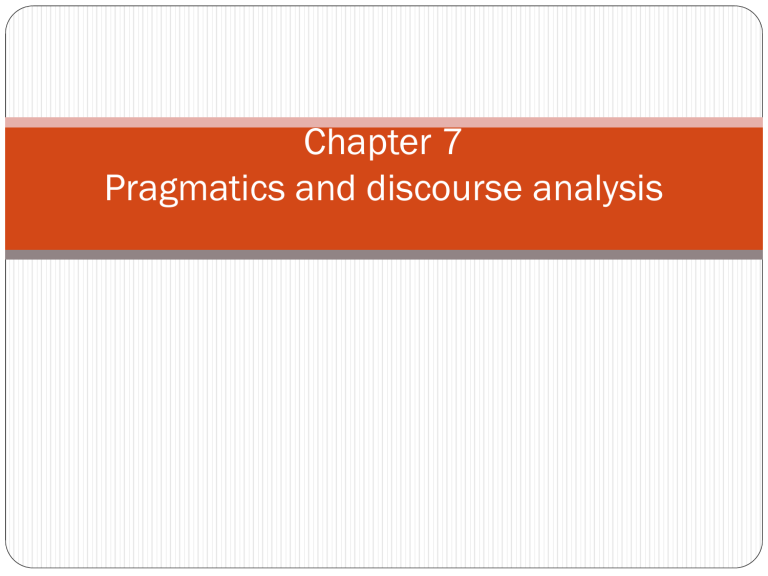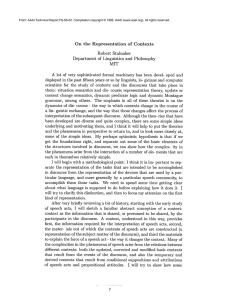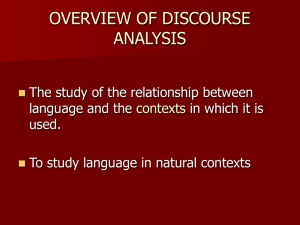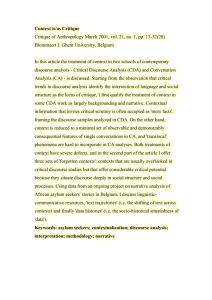Chapter 7 Pragmatics and discourse analysis

Chapter 7
Pragmatics and discourse analysis
Outline
1. Pragmatics: meaning and contexts
2. Speech act
3. Presupposition
4. Deitics
5. Discourse and Analysis
(1) New vs. old information
(2) Co-operative principle
(3) Relevance theory
6. Summary
Pragmatics
Linguistic contexts or settings refer to the occasions or timing when a dialogue or a conversation occurs.
Physical contexts
• settings involved with matters about who, what, when, where, and how
Epistemic contexts
Linguistic contexts
• A comfortable dialogue might be meaningful for the speakers and listeners, because they share the same backgrounds or knowledge.
• what language or accent is spoken and what tone or voice is intended to be conveyed or expressed
• cultural or historical oriented
Social contexts formal setting:
informal settings: casual or informal dictions, e.g. vulgar words, slangs, local accents, etc.
Pragmatics: Physical contexts
A: May I help you?
B: Yes, I would like to see the bag over there.
• Setting: Department store
• The clerk (A) speaks in a polite way, and she is ready to offer any help you need.
Pragmatics: Epistemic contexts
A : Hey, remember that? I’ve got it.
B: Hey, you did, didn’t you?
• There is no specific information revealed.
Speech Acts (1)- locution
A locution happens when a statement is spoken without any specific reference to one’s intention or preoccupied ideas. a. I have two books.
b. There is a cow under the tree.
c. He seems to be smart.
A sentence containing a constative verb (e.g. appear, seem, look,
taste, smell, etc.) is a locutionary sentence.
Speech Acts (2-1)- Direct illocution
The will of the speaker is strongly conveyed in the verbs .
The verbs used in illocutionary sentences are performative verbs
Speech Acts (2-2)- Indirect illocution
a. Don’t do it.
b. I’ll be there. c. Stop it.
what illocution refers to relies very much on the selection of verbs.
Speech Acts (2-3)- Indirect illocution
Here comes John.
(1) Now that John has come, why don’t you yield?
(2) I warn you to yield, for my boss John has come.
(3) I warn you that John has come.
Speech Acts (3)- Recognition of illocutionary force
a. Can you help open the door, John?
b. John, go and open the door.
(
( ask ) order ) c. Open the door, John, or I won’t give you candy.
( threaten ) d. John, would you help open the door?
( request ) e. John, open the door!
( order ) f. I bet that John won’t open the door for us. ( bet ) g. John, I advise you to open the door.
( advise )
Speech Acts (4)- Felicity condition
Felicity condition: The action or performance of the verb should be fulfilled without failure.
(a) the speaker is able to have what he puts in the illocution carried out
(b) the listener cares what is put in the illocution.
Presupposition (1)
Deals with words in which some ideas have been preoccupied.
a. John has quit smoking.
→ John smokes or John has been smoking b. John’s brother does not live with that woman any more.
→ John has a brother or John’s brother lived with a woman. c. John would like to have another cup of coffee.
→ The speaker has in mind that John had at least one cup
of coffee.
Presupposition (2)
a. Would you give him another chance?
b. Do you need more coffee?
c. John married once again .
Presupposition (3):implication
John still keeps the Wall in his mind even though he has moved to West Germany for two years.
→ Background Knowledge : After 1945, there was a great wall built for the separation of West Germany from East
Germany.
Presupposition (4): entailment
The meaning of B can be implied or ensured from A.
1a. Mary’s daughter is studying at that school.
1b. Mary has a daughter.
1c. Mary is a mother.
→ From (a), it can be entailed that (b) and (c) are true.
Deitics (1):
It refers to pronouns like you, he, they, then, that, this, etc.
a. John told Bill that he
1 meet his
3 sister.
would like to ask his
2
→ which refers to John or to Bill is far from clear. father to b. He is the greatest poet for the time being.
→ in the 19 th or 21 st century?
Discourse Analysis (1):
New vs. old information
New information: stress & is headed with an indefinite article (a or an)
a. He wanted to buy a book for her. The book should be concerned with English learning or teaching.
b. When he took a walk to the park, he saw a squirrel . The squirrel was so cute that he stopped for a while, looking at it .
Discourse Analysis(2-1):
Co-operative principle
In some contexts, a response to a dialogue or question would raise some misunderstanding because of no knowledge of cooperative principle (Grice)
Male: My love to you never changes, until the end of the earth.
Female: (angrily) How come it would be so? We’ve just dated for less than one year, and your love won’t change, always staying at that level?
Male: (embarrassing)
→ British philosopher H. P. Grice created a word implicature to account for such a mismatch.
Discourse Analysis(2-2):
Co-operative principles
The maxim of quantity
• Participants must provide enough information , no more and no less, for proper communication
The maxim of quality
• Participants provide genuine information , no false or information without proof.
The maxim of relation
The maxim of manner
• All the talks should be related to the topic .
Participants should make his words clear : to be clear, to be brief, to be orderly, to avoid ambiguity.
Discourse Analysis(2-3):
Co-operative principle
Polonius: What do you read, my lord?
Hamlet: Words, words, words.
Polonius: What is the matter, my lord?
Hamlet: Between who?
Polonius: I mean, the matter that you read, my lord.
Hamlet: Slanders, sir. For the satirical rogue says here that old men have grey beards, that their faces are wrinkled, their eyes purging thick amber and plumtree gum, and that they have a plentiful lack of wit, together with most weak hams: all which, sir, though I most powerfully and potently believe, yet I hold not honesty to have it thus set down; for yourself, sir, should grow old as I am, if like a crab you could go backward.
Discourse Analysis(2-5):
Co-operative principle
A : Did you meet John yesterday?
B : Sure. He wanted me to say Hello to you.
A : What did he say?
B : He wanted to show his best wishes to you.
→ each utterance is in coherence in quantity
Discourse Analysis(3):
Relevance Theory
(a) In order to make a conversation successful, the participant would tell the truth , therefore, the maxim of quality is unnecessary.
‘I’m sick’ he is not yet ‘ill’, but he just feels uncomfortable.
(b) The relevance theory is in fact concerned with quantity , because only when it is relevant, the information exchanged is enough in quantity.
(c) Relevance theory is closely related to relation in terms of topic.
(d) It is redundant to require participants to be clear and brief in manner, because all the participants would make it the goal to communicate well.
Summary
1. pragmatics : physical context, epistemic context, linguistic context, and social context.
2. speech acts: illocution forces (e.g. ask, promise, order,
warn, request.)
3. presupposition: e.g. again or another apparently implies something has been there
4. deitics: deitics is used only when the speaker and the listener share some common backgrounds
5. discourse analysis: (a) new vs. old information
(b) cooperative principle (Grice)
(c) relevance theory




